Ziegfeld Follies was my first cinematic glimpse of Esther Williams in action, and she was wildly hypnotic. A water nymph in three dimensions, a woman making incredibly taxing and athletic movements look seamless and smooth. It was as if the water and her body were in an extended romantic dance, and this brief segment made me curious as to what treasures her films would hold. So I decided to start with Bathing Beauty, Williams’ first major film role, and the one that launched her as a bankable aquacade musical star.
Is Bathing Beauty a good movie? Well, not really, but it is a solidly built piece of entertainment, this will become a common thread in discussing Williams’ films. The film is obviously a patch-work, originally intended as a vehicle for Red Skelton called Mr. Co-Ed but retooled midway to add in more Williams aquatics, the film feels of two-minds at any given point. The story is a highly improbable thing, as can only be found in musicals or screwball comedies, which exists mostly to string together a series of amusing diversions for Skelton to mug his way through before finally handing the ridiculous finale over to Williams for a fire-and-water spectacular.
There are several strange moments in Bathing Beauty, like a series of random musical guests like Xaiver Cugat, Carlos Ramirez, or Harry James & His Orchestra, and a wasted Basil Rathbone preening as a fey villain, who doesn’t truly have much to do. None of this is a big concern as by this time MGM had already processed and streamlined the various formulas for their star vehicles. Even if an entire movie, like this one, isn’t that great, it still has charm to spare, a propulsive energy, and bright popping colors to distract from the thin plot, goofy dialog, and wasted supporting talent. Bathing Beauty is all surface spectacle, really silly and fun spectacle, but nothing that lasts very long in the memory aside from the grand finale.
Bathing Beauty
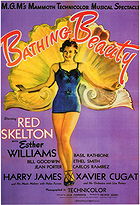 Posted : 10 years, 9 months ago on 16 September 2014 09:16
(A review of Bathing Beauty (1944))
Posted : 10 years, 9 months ago on 16 September 2014 09:16
(A review of Bathing Beauty (1944)) 0 comments, Reply to this entry
0 comments, Reply to this entry
Girl, Interrupted
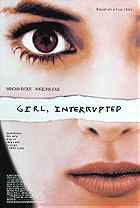 Posted : 10 years, 9 months ago on 15 September 2014 06:58
(A review of Girl, Interrupted)
Posted : 10 years, 9 months ago on 15 September 2014 06:58
(A review of Girl, Interrupted)There’s nothing explicitly wrong with Girl, Interrupted, just a general sense that we have seen this material done before, much better, and with a more authentic tone. Striving hard for the same amount of pedigree and prestige as One Flew Over the Cuckoo’s Nest, but ending up a pileup of clichés from various “looney bin” movies, Girl, Interrupted is handsome looking and well-acted, but that’s about it.
The movie begins with a disjointed look at the tumultuous time, a brief window into the fragmented mind of our main character. Soon afterwards though, the film abandons this more daring visual style for a handsome but bland awards-bait look. And as it progresses forward, the film begins inventing entire sequences which feel completely artificial to the more harrowing moments. The most obvious and egregious of these is a scene late in the film where Winona Ryder and Angelina Jolie have escaped the asylum, runaway to visit Brittany Murphy’s fragile bulimic, and find Murphy’s dead body in the bathroom the following morning. This scene strives hard for pathos, but it feels wholly invented for the purposes of making Jolie’s character a villainous conception.
That’s another problem with the film, as told from Ryder’s fractured perspective, various characters change from scene-to-scene with little consistency in their character’s development. Jolie’s suffers the worst, and as someone dealing with a personality disorder, some of this can be explained away. Yet the transition from wounded animal to purposefully being a villain isn’t smoothly traversed or explained. But Jolie is absolutely dynamite in the role, playing every wild outburst and manic fit for all its worth. She scorches the earth with her wild intensity, leaving just about every single other actor in her vicinity as a pile of ash from the intensity of her glow and commitment to the role.
Which doesn’t mean that Ryder isn’t doing great work herself, in fact, this is probably one of the best performances of her career, right up there with The Age of Innocence and Heathers. As a producer on the film as well, it’s clear that some of the more artificial scenes were invented to give her more time to demonstrate her range in the film, and Ryder does solid work, but her role isn’t showy. And when next to Jolie’s wild-woman, she sometimes falls into the background. This sounds a solid way to encapsulate the entire film – never truly bad, handsomely made, but lacking in the grit and reality that made other movies like this more lingering in the imagination.
The movie begins with a disjointed look at the tumultuous time, a brief window into the fragmented mind of our main character. Soon afterwards though, the film abandons this more daring visual style for a handsome but bland awards-bait look. And as it progresses forward, the film begins inventing entire sequences which feel completely artificial to the more harrowing moments. The most obvious and egregious of these is a scene late in the film where Winona Ryder and Angelina Jolie have escaped the asylum, runaway to visit Brittany Murphy’s fragile bulimic, and find Murphy’s dead body in the bathroom the following morning. This scene strives hard for pathos, but it feels wholly invented for the purposes of making Jolie’s character a villainous conception.
That’s another problem with the film, as told from Ryder’s fractured perspective, various characters change from scene-to-scene with little consistency in their character’s development. Jolie’s suffers the worst, and as someone dealing with a personality disorder, some of this can be explained away. Yet the transition from wounded animal to purposefully being a villain isn’t smoothly traversed or explained. But Jolie is absolutely dynamite in the role, playing every wild outburst and manic fit for all its worth. She scorches the earth with her wild intensity, leaving just about every single other actor in her vicinity as a pile of ash from the intensity of her glow and commitment to the role.
Which doesn’t mean that Ryder isn’t doing great work herself, in fact, this is probably one of the best performances of her career, right up there with The Age of Innocence and Heathers. As a producer on the film as well, it’s clear that some of the more artificial scenes were invented to give her more time to demonstrate her range in the film, and Ryder does solid work, but her role isn’t showy. And when next to Jolie’s wild-woman, she sometimes falls into the background. This sounds a solid way to encapsulate the entire film – never truly bad, handsomely made, but lacking in the grit and reality that made other movies like this more lingering in the imagination.
 0 comments, Reply to this entry
0 comments, Reply to this entry
The Messenger
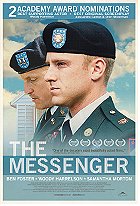 Posted : 10 years, 9 months ago on 15 September 2014 06:58
(A review of The Messenger)
Posted : 10 years, 9 months ago on 15 September 2014 06:58
(A review of The Messenger)As a rule, I’m generally pretty wary of films that tackle pressing issues that are currently major headlines in the news. The subject matter is often so fresh, so exhaustively covered, that I find it sometimes hard for film-makers to bring a new perspective to it. Or the films can feel well-intentioned but reductive. This is why it took me so long to get around to watching The Messenger.
Well, shame on me for waiting. While not a perfect movie, The Messenger is an incredibly well-made character study of two men who have the awful job of telling the loved ones of fallen soldiers the bad news. No one wants that job, and the film does a pretty solid job of exploring the various reactions that bereaved loved ones are capable of having. Steve Buscemi has a minor role as the father of a dead solider, and his anger and grief are palpable, only growing in strength and intensity as he follows them back to their car. Others break down, and Samantha Morton’s widow has the most curious reaction, which we will come back to later on.
After being injured in combat, a young soldier (Ben Foster) is reassigned to Casualty Notification Division where he meets an older officer who has been doing the job for a long time (Woody Harrelson). The Messenger mostly follows their dynamic as Foster tries to help and readjust to civilian life. While informing Morton that her husband has died in combat, she thanks them, appears to not react, and is extremely polite. Foster is fascinated by this woman, and their strange semi-romance takes on a major part of the rest of the film.
I appreciated that the film decided to eschew politics of war in favor of examining people, but the romance aspect of The Messenger was troublesome to me. While everything else in the film feels authentic, the romance feels underdeveloped, like a few scenes bridging the transition from Foster trying to figure out why Morton’s character initially appeared resigned to the news to becoming a new possible romantic partner are missing. But Morton and Foster work well together, generating a real life chemistry. Slightly awkward, frightened to reach out to someone else and try to forge a connection, they feel like two real, damaged people trying to regain their emotional footing during a transitional period of time.
While this piece of the story, which takes over a good portion of the second half, feels a little strained, the rest works beautifully. And much of that credit needs to go to the three main actors. Foster, an underrated talent, gives a quiet but powerful performance. The role could have easily offered him a chance to showboat, but Foster sidesteps that obvious choice. Harrelson deservedly got a second career Oscar nomination, and his interplay with Foster creates a unique spin on the mentor-student relationship. Harrelson gets plenty of moments to rage, but it’s the humor that he uses to deal with the tragedy surrounding his life resonates strongly. And Morton, another undervalued performer, is quietly heartbreaking and poetic. The Messenger is a film about the Iraq war that prefers to look at the people back home, and this choices makes for an intense and rewarding experience. It’s a moment of human connection, and we could all use more of that.
Well, shame on me for waiting. While not a perfect movie, The Messenger is an incredibly well-made character study of two men who have the awful job of telling the loved ones of fallen soldiers the bad news. No one wants that job, and the film does a pretty solid job of exploring the various reactions that bereaved loved ones are capable of having. Steve Buscemi has a minor role as the father of a dead solider, and his anger and grief are palpable, only growing in strength and intensity as he follows them back to their car. Others break down, and Samantha Morton’s widow has the most curious reaction, which we will come back to later on.
After being injured in combat, a young soldier (Ben Foster) is reassigned to Casualty Notification Division where he meets an older officer who has been doing the job for a long time (Woody Harrelson). The Messenger mostly follows their dynamic as Foster tries to help and readjust to civilian life. While informing Morton that her husband has died in combat, she thanks them, appears to not react, and is extremely polite. Foster is fascinated by this woman, and their strange semi-romance takes on a major part of the rest of the film.
I appreciated that the film decided to eschew politics of war in favor of examining people, but the romance aspect of The Messenger was troublesome to me. While everything else in the film feels authentic, the romance feels underdeveloped, like a few scenes bridging the transition from Foster trying to figure out why Morton’s character initially appeared resigned to the news to becoming a new possible romantic partner are missing. But Morton and Foster work well together, generating a real life chemistry. Slightly awkward, frightened to reach out to someone else and try to forge a connection, they feel like two real, damaged people trying to regain their emotional footing during a transitional period of time.
While this piece of the story, which takes over a good portion of the second half, feels a little strained, the rest works beautifully. And much of that credit needs to go to the three main actors. Foster, an underrated talent, gives a quiet but powerful performance. The role could have easily offered him a chance to showboat, but Foster sidesteps that obvious choice. Harrelson deservedly got a second career Oscar nomination, and his interplay with Foster creates a unique spin on the mentor-student relationship. Harrelson gets plenty of moments to rage, but it’s the humor that he uses to deal with the tragedy surrounding his life resonates strongly. And Morton, another undervalued performer, is quietly heartbreaking and poetic. The Messenger is a film about the Iraq war that prefers to look at the people back home, and this choices makes for an intense and rewarding experience. It’s a moment of human connection, and we could all use more of that.
 0 comments, Reply to this entry
0 comments, Reply to this entry
The Rat Race
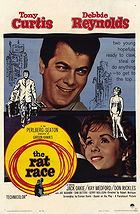 Posted : 10 years, 9 months ago on 15 September 2014 06:58
(A review of The Rat Race)
Posted : 10 years, 9 months ago on 15 September 2014 06:58
(A review of The Rat Race)Not great by any specific measure, but The Rat Race is an interesting viewing experience to see two big movie stars trying to desperately to expand their range and move beyond their personas. But neither of the two stars are able to overcome their default modes and create the necessary grit and texture required for the parts. Same could be said of the script, which takes a fairly basic conceit and stumbles around for a fresh spin on these beats. Hell, a lack of a fresh viewpoint could be easily forgiven if the film had been able to competently traverse the material. Director Robert Mulligan plays the film straight, which is great for developing nuance in spots, but can’t smoothly handle the various inherent problems with the narrative.
But the main reason to watch The Rat Race is to see Debbie Reynolds and Tony Curtis struggle to develop as actors and escape their sunny, comic personas. Curtis is cast wildly against type as a naïve youth from the country who has moved to the big city to try to make it as a musician. Curtis cannot suppress his New York accent, and it continuously pokes through. Neither can he hide the innate jadedness, that edge that made his comedic work in Some Like It Hot swing, which sinks his characterization before it even begins. Reynolds on the other hand simply cannot hide her movie star giddiness and sheen. This is a woman who made her career playing perky, can-do women with enough energy and verve to power a large city. The Rat Race asks her to dim that down and play someone beaten down, and she almost gets there if it weren’t for her movie star charisma. Reynolds would later go on to become a gifted character actress, her work in the recent Behind the Candelabra is a winner. The Rat Race is never truly terrible, but it’s also not very good. It’s mostly just a fascinating failure/lesser known title in everyone’s filmography.
But the main reason to watch The Rat Race is to see Debbie Reynolds and Tony Curtis struggle to develop as actors and escape their sunny, comic personas. Curtis is cast wildly against type as a naïve youth from the country who has moved to the big city to try to make it as a musician. Curtis cannot suppress his New York accent, and it continuously pokes through. Neither can he hide the innate jadedness, that edge that made his comedic work in Some Like It Hot swing, which sinks his characterization before it even begins. Reynolds on the other hand simply cannot hide her movie star giddiness and sheen. This is a woman who made her career playing perky, can-do women with enough energy and verve to power a large city. The Rat Race asks her to dim that down and play someone beaten down, and she almost gets there if it weren’t for her movie star charisma. Reynolds would later go on to become a gifted character actress, her work in the recent Behind the Candelabra is a winner. The Rat Race is never truly terrible, but it’s also not very good. It’s mostly just a fascinating failure/lesser known title in everyone’s filmography.
 0 comments, Reply to this entry
0 comments, Reply to this entry
The Piano
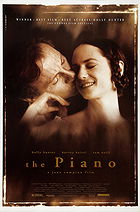 Posted : 10 years, 9 months ago on 15 September 2014 06:58
(A review of The Piano (1993))
Posted : 10 years, 9 months ago on 15 September 2014 06:58
(A review of The Piano (1993))Holly Hunter won her Best Actress Oscar over some incredible competition – Emma Thompson, Angela Bassett, Debra Winger, and Stockard Channing – any of whom would have been a great choice. But there’s something about Hunter’s fierce, sensual Ada, a mute woman who expresses herself through her piano and her young daughter, Flora (Anna Paquin). The Piano tells the story of Ada’s regaining her voice, both literally and figuratively, and finding her sexuality in the harsh New Zealand landscape.
The film begins with Ada and Flora arriving on the New Zealand coast to meet Ada’s arranged husband, Stewart (Sam Neill). Over this tableau Ada narrates that she has not spoken since she was six-years-old and nobody, least of all herself, has any idea why. Ada’s giant hoop skirt and European airs, she’s originally from Scotland, are in stark contrast to the looser clothing of the Maori tribesman and Stewart. Much of The Piano sees her growing out of these European ideals, growing out of the forced silence and servitude expected of females, and into her own autonomous person. Quite a bit of her change in attitude comes through a romance between her and Baines (Harvey Keitel), a former whaler who lives on the island and has become one of the Maori.
During her initial meeting with her new husband, he decides to leave her piano on the beach because he does not want to carry it back to his home. When Ada has her daughter try to explain that she needs the piano as a form of communication, he replies that a silent woman has never bothered him. As their marriage progresses there is no warmth or love that grows between them. Flora prefers to create havoc and mischief, and then proclaim innocence as she purposefully misinterprets or edits out parts of the conversation. Once Stewart sells the piano to Baines that sets in motion a series of events which lead to Ada’s awakening and blossoming.
Baines removes the keys from the piano and promises them back to Ada if she will perform various seductive tasks. A bit questionable, but Baines and Ada have an immediate erotic connection, a meeting of the minds. She’s willing, and willful, to engage him in this back and forth. After a period of time, she has mastered his seductive games and flips them upon him. A romance and love develop between them. The color palette of the film, so far basked in harsh grays and blues, begins to warm into richer colors.
The cinematography by Stuart Dryburgh enhances Jane Campion’s script and directorial choices. It doesn’t just work well with the film, it allows many of the themes and emotions in the film to grow and prosper. Many of the images that linger in the imagination are painter-esque, like Paquin’s Flora frolicking on the beach while Ada plays the piano stuck in the sand. It’s sumptuous film-making, the kind of work that Michael Powell did with Jack Cardiff.
And Campion has chosen well with her four leading actors. Hunter makes Ada grim, dour, a person who lives in their own interior world, refusing to express or interact with the outside world. But as she plays her piano, she escapes and bursts with romantic and erotic longing. She also conveys Ada’s stubbornness; above all else she must have the piano. What’s most transfixing in the moments when Hunter plays the piano is how she transforms into an ethereal figure, losing herself in the music.
Anna Paquin’s work is fairly extraordinary. Child actors in movies can be overly precocious, falling back on their cuteness, or they can be directed to act like miniature versions of adults. Paquin has to straddle the line between being a normal little girl and the mouthpiece of her adult mother. Her Flora is spiteful, a naughty wood nymph who lies breathlessly for her own amusement. Paquin actually is a subtle master class in presenting someone who must say one thing with her voice, but communicate something entirely different with her body language as she speaks aloud for the mother who cannot.
Neill and Keitel offer great support to the two leading female roles. Neill starts off as a well-meaning, if cold and distant, husband who grows into a paranoid and fearful man. While Keitel starts off as a man who is all hard-edges and brutish behavior, before slowly melting away into a tender lover and surrogate father.
The Piano plays like one of the best adaptations of a gothic romance ever made. A totally original movie, with finely detailed and complex female characters in the lead, The Piano is easily a classic in my eyes. A gorgeous, sumptuous feast, a film that populates a specific area in time with unique characters and explores their world thoroughly.
The film begins with Ada and Flora arriving on the New Zealand coast to meet Ada’s arranged husband, Stewart (Sam Neill). Over this tableau Ada narrates that she has not spoken since she was six-years-old and nobody, least of all herself, has any idea why. Ada’s giant hoop skirt and European airs, she’s originally from Scotland, are in stark contrast to the looser clothing of the Maori tribesman and Stewart. Much of The Piano sees her growing out of these European ideals, growing out of the forced silence and servitude expected of females, and into her own autonomous person. Quite a bit of her change in attitude comes through a romance between her and Baines (Harvey Keitel), a former whaler who lives on the island and has become one of the Maori.
During her initial meeting with her new husband, he decides to leave her piano on the beach because he does not want to carry it back to his home. When Ada has her daughter try to explain that she needs the piano as a form of communication, he replies that a silent woman has never bothered him. As their marriage progresses there is no warmth or love that grows between them. Flora prefers to create havoc and mischief, and then proclaim innocence as she purposefully misinterprets or edits out parts of the conversation. Once Stewart sells the piano to Baines that sets in motion a series of events which lead to Ada’s awakening and blossoming.
Baines removes the keys from the piano and promises them back to Ada if she will perform various seductive tasks. A bit questionable, but Baines and Ada have an immediate erotic connection, a meeting of the minds. She’s willing, and willful, to engage him in this back and forth. After a period of time, she has mastered his seductive games and flips them upon him. A romance and love develop between them. The color palette of the film, so far basked in harsh grays and blues, begins to warm into richer colors.
The cinematography by Stuart Dryburgh enhances Jane Campion’s script and directorial choices. It doesn’t just work well with the film, it allows many of the themes and emotions in the film to grow and prosper. Many of the images that linger in the imagination are painter-esque, like Paquin’s Flora frolicking on the beach while Ada plays the piano stuck in the sand. It’s sumptuous film-making, the kind of work that Michael Powell did with Jack Cardiff.
And Campion has chosen well with her four leading actors. Hunter makes Ada grim, dour, a person who lives in their own interior world, refusing to express or interact with the outside world. But as she plays her piano, she escapes and bursts with romantic and erotic longing. She also conveys Ada’s stubbornness; above all else she must have the piano. What’s most transfixing in the moments when Hunter plays the piano is how she transforms into an ethereal figure, losing herself in the music.
Anna Paquin’s work is fairly extraordinary. Child actors in movies can be overly precocious, falling back on their cuteness, or they can be directed to act like miniature versions of adults. Paquin has to straddle the line between being a normal little girl and the mouthpiece of her adult mother. Her Flora is spiteful, a naughty wood nymph who lies breathlessly for her own amusement. Paquin actually is a subtle master class in presenting someone who must say one thing with her voice, but communicate something entirely different with her body language as she speaks aloud for the mother who cannot.
Neill and Keitel offer great support to the two leading female roles. Neill starts off as a well-meaning, if cold and distant, husband who grows into a paranoid and fearful man. While Keitel starts off as a man who is all hard-edges and brutish behavior, before slowly melting away into a tender lover and surrogate father.
The Piano plays like one of the best adaptations of a gothic romance ever made. A totally original movie, with finely detailed and complex female characters in the lead, The Piano is easily a classic in my eyes. A gorgeous, sumptuous feast, a film that populates a specific area in time with unique characters and explores their world thoroughly.
 0 comments, Reply to this entry
0 comments, Reply to this entry
Saratoga
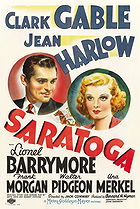 Posted : 10 years, 10 months ago on 15 August 2014 06:53
(A review of Saratoga)
Posted : 10 years, 10 months ago on 15 August 2014 06:53
(A review of Saratoga)Jean Harlow died mid-way through the production of Saratoga, and her absence can be strongly felt in the film. During the first half of the film, Saratoga provides Harlow with a snappy, banter filled screenplay to fire off flirtations and sarcastic comebacks with equal fervor at Clark Gable. We’ve already started off on the right foot here, but then the film goes wonky, no longer the tightly scripted and paced rapid-fire romance with a background in horse track drama, instead Saratoga is working hard to cover up Harlow’s disappearance from the plot.
Employing body doubles and voice actors to give a vague impression of her in a small handful of scenes, these newly written segments draw attention to themselves and away from the story. It’s clearly someone doing a Harlow impersonation with a large hat covering her face, or her back turned towards the camera so we can’t see her face. Plot strands that were expected to pay off with her character and now rushed to completion with someone else doing the exposition, or newly invented scenarios to try to steer the film from its logical story beats into the same destinations but on a new track. Of course, the death of your leading star mid-production will do that to a film, so one wonders why they didn’t just scrap it all together or recast the main role.
As it stands, Personal Property is a better swan song for Harlow’s talents and particular star persona. Saratoga’s decision to forge ahead and paper over their problems remains questionable to me. Would the film had been better if the decision to re-start production with Jean Arthur had gone ahead? I don’t know. Maybe it would have been a more cohesive product, no one can really say for sure. But if Harlow had lived to the end of it, based on what was there, Saratoga would have been a fine way to say goodbye to one of the original bombshells, and truly gifted comedienne.
Employing body doubles and voice actors to give a vague impression of her in a small handful of scenes, these newly written segments draw attention to themselves and away from the story. It’s clearly someone doing a Harlow impersonation with a large hat covering her face, or her back turned towards the camera so we can’t see her face. Plot strands that were expected to pay off with her character and now rushed to completion with someone else doing the exposition, or newly invented scenarios to try to steer the film from its logical story beats into the same destinations but on a new track. Of course, the death of your leading star mid-production will do that to a film, so one wonders why they didn’t just scrap it all together or recast the main role.
As it stands, Personal Property is a better swan song for Harlow’s talents and particular star persona. Saratoga’s decision to forge ahead and paper over their problems remains questionable to me. Would the film had been better if the decision to re-start production with Jean Arthur had gone ahead? I don’t know. Maybe it would have been a more cohesive product, no one can really say for sure. But if Harlow had lived to the end of it, based on what was there, Saratoga would have been a fine way to say goodbye to one of the original bombshells, and truly gifted comedienne.
 0 comments, Reply to this entry
0 comments, Reply to this entry
Personal Property
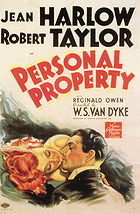 Posted : 10 years, 10 months ago on 15 August 2014 06:53
(A review of Personal Property)
Posted : 10 years, 10 months ago on 15 August 2014 06:53
(A review of Personal Property)Damn you, W.S. “Woody” Van Dyke! I mean, you’ve given the world The Thin Man, as perfect a romance/screwball comedy/noir as a movie can be, but your filmography is also littered with films hampered by your “one-and-done” philosophy of film-making.
Personal Property is the giddy, romantic, screwball comedy just yearning for a director like Preston Sturges, Howard Hawks, or Ernst Lubitsch to nurture and flower into full bloom. The completely ridiculous plot is the type we typically see in a screwball comedy: battle of the sexes, battle between the classes, mistaken identities, courting one person while falling in love with another. It’s a frothy entertainment, and could have been much better with a director more suited to this material.
But Personal Property is charming enough as it exists. Jean Harlow and Robert Taylor play off of each other nicely, and develop a pleasing chemistry. A scene in which they mime a picnic in their house is all small glances, bubbling attraction, and spritely verbal sparring. They’re given tremendous support from veteran character actors like E.E. Clive and the always welcome, slightly screechy Una O’Connor. Watching Harlow in this film, one would never guess that this was her final completed performance, and that she would die soon after. She seems so alive, like the fiery Pre-Code Harlow had finally found a proper vehicle for her charms and wits in this new era.
Personal Property is the giddy, romantic, screwball comedy just yearning for a director like Preston Sturges, Howard Hawks, or Ernst Lubitsch to nurture and flower into full bloom. The completely ridiculous plot is the type we typically see in a screwball comedy: battle of the sexes, battle between the classes, mistaken identities, courting one person while falling in love with another. It’s a frothy entertainment, and could have been much better with a director more suited to this material.
But Personal Property is charming enough as it exists. Jean Harlow and Robert Taylor play off of each other nicely, and develop a pleasing chemistry. A scene in which they mime a picnic in their house is all small glances, bubbling attraction, and spritely verbal sparring. They’re given tremendous support from veteran character actors like E.E. Clive and the always welcome, slightly screechy Una O’Connor. Watching Harlow in this film, one would never guess that this was her final completed performance, and that she would die soon after. She seems so alive, like the fiery Pre-Code Harlow had finally found a proper vehicle for her charms and wits in this new era.
 0 comments, Reply to this entry
0 comments, Reply to this entry
Suzy
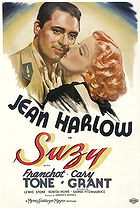 Posted : 10 years, 10 months ago on 15 August 2014 06:53
(A review of Suzy)
Posted : 10 years, 10 months ago on 15 August 2014 06:53
(A review of Suzy)Funny thing about the Studio Era of Hollywood, they were the best at crafting films built entirely around a star’s persona, using each release to craft and hone that image and play with its various limitations and expansions. On the reverse of that, you also end with films that were crafted for one star, but ended up with an entirely different one in the lead. Suzy has a bit of an identity crisis.
It’s not a bad film; it’s just wildly unsettled and can’t decide which version of itself that it wants to be. Is it the sweeping romance with Harlow on one end and two different men on the other? Or is it the WWI espionage war-time thriller, complete with spies and scenes of aerial combat? Both of them could work, but they don’t work together. The espionage material feels rushed and tacked on, the love triangle is a soggy mess.
Jean Harlow was clearly not the first choice for the title role, as the film frequently handicaps her madcap erotic energy into a dressed down, good girl role that she plays well, but it doesn’t highlight her strengths as an actress. Any number of actresses from the era could have played it, and done it just as well. It’s just another role in which Harlow’s innate gifts for screwball comedy, or cracking wise and posing tough are watered down to give her image a cleaner appeal. Personally, I miss the Pre-Code motor-mouth with the zany eroticism.
Cary Grant and Franchot Tone are the two men in her life, one a scoundrel who feels like a wrong fit for Grant’s more dream-lover charms, and the other a thought-dead nice guy. It’s refreshing to see Tone not give in to pouty, rich, daddy’s boy mannerisms that hampered his earlier roles, and he and Harlow still generate a pleasing romantic chemistry and play off of each other well. Allegedly, Grant’s role was originally intended for Clark Gable, and the rougher, alpha-male party boy feels like a perfect fit for Gable’s sensibilities. Grant’s never terrible, but he feels ill-suited for this role at this time.
Suzy is mostly notable for its dynamic dog-fight scenes, which were leftovers from Hell’s Angels, Harlow’s big break. These aerial sequences are fluid and adventurous in a way that much of the rest of the film is not. They stand in high contrast to the stately production of the rest of the film. As if every problem with it could be summarized in the back and forth between the kinetic views of planes in tailspin, then the quick cut to Harlow trying to keep a happy home and worrying about the men in her life.
It’s not a bad film; it’s just wildly unsettled and can’t decide which version of itself that it wants to be. Is it the sweeping romance with Harlow on one end and two different men on the other? Or is it the WWI espionage war-time thriller, complete with spies and scenes of aerial combat? Both of them could work, but they don’t work together. The espionage material feels rushed and tacked on, the love triangle is a soggy mess.
Jean Harlow was clearly not the first choice for the title role, as the film frequently handicaps her madcap erotic energy into a dressed down, good girl role that she plays well, but it doesn’t highlight her strengths as an actress. Any number of actresses from the era could have played it, and done it just as well. It’s just another role in which Harlow’s innate gifts for screwball comedy, or cracking wise and posing tough are watered down to give her image a cleaner appeal. Personally, I miss the Pre-Code motor-mouth with the zany eroticism.
Cary Grant and Franchot Tone are the two men in her life, one a scoundrel who feels like a wrong fit for Grant’s more dream-lover charms, and the other a thought-dead nice guy. It’s refreshing to see Tone not give in to pouty, rich, daddy’s boy mannerisms that hampered his earlier roles, and he and Harlow still generate a pleasing romantic chemistry and play off of each other well. Allegedly, Grant’s role was originally intended for Clark Gable, and the rougher, alpha-male party boy feels like a perfect fit for Gable’s sensibilities. Grant’s never terrible, but he feels ill-suited for this role at this time.
It's a shame that Suzy is the lone pairing of Harlow and Grant as this is not the ideal scenario for the pair to try and generate some chemistry. Grant was not an irredeemable cad, and Harlow worked best against men who either matched her carnality (Gable), humor (Powell), or against her class (Tone). He's too stiff here and missing that delightful sense of queerness that appears in his better pairings like with Katharine Hepburn and Rosalind Russell. Still, since this is their sole pairing, that does mean Suzy is worth checking out to see two of American cinema's greatest stars acting opposite each other.
Suzy is mostly notable for its dynamic dog-fight scenes, which were leftovers from Hell’s Angels, Harlow’s big break. These aerial sequences are fluid and adventurous in a way that much of the rest of the film is not. They stand in high contrast to the stately production of the rest of the film. As if every problem with it could be summarized in the back and forth between the kinetic views of planes in tailspin, then the quick cut to Harlow trying to keep a happy home and worrying about the men in her life.
 0 comments, Reply to this entry
0 comments, Reply to this entry
Donnie Brasco
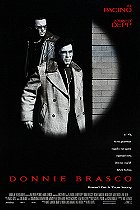 Posted : 10 years, 10 months ago on 11 August 2014 08:21
(A review of Donnie Brasco)
Posted : 10 years, 10 months ago on 11 August 2014 08:21
(A review of Donnie Brasco)Donnie Brasco is an interesting bit of undercover cop drama, in that the undercover cop begins to feel empathy, friendship, and develop a strong bond with his new mentor in the mafia. The fun is in watching our undercover cop struggling valiantly with his allegiance, trying to decide to stick with his missions or help out his new friend.
While watching Donnie Brasco I was reminded of what a great actor Johnny Depp used to be, before he decided to hide behind increasingly deranged makeups and giving kooky readings instead of truly inhabiting and developing a character. I miss this Depp, who could pick strange projects or characters, but imbue them with an inner life. And it’s great to watch him slowly transition from interloper to inside man to conflicted friend. His brittle nerves and moral quagmire constantly written all over his face with each return visit home. Anne Heche does solid work as his fretting, worried wife who is sinking more often than she’s floating to keep everything together and remain strong.
Outside of the The Godfather trilogy, I’ve rarely, if ever, managed to warm-up to Al Pacino as an actor. I find him to frequently turn the dial up to eleven to start, and only get louder as he progresses with a characterization. Sometimes that scenery chewing tendency is a great antidote to a lackluster film (Dick Tracy), and other times it’s not (Scent of a Woman). Here Pacino starts at a lower-level and gradually builds to the larger one, and I quite enjoyed his performance. A scene where it’s open to debate whether or not he’s figured out that Depp is deceiving him at a houseboat is a marvel of nervous energy and suspicious behavior trying to be masked by a cracking exterior.
My only real complaint is that director Mike Newell frequently tries to steal from the GoodFellas playbook. It led me to wondering what Scorsese could have conjured up with this cast and this material. There are many times at which Newell’s choices in film-making feel less organic and his own, than a brief consideration of “What Would Scorsese Do?” This does not torpedo the film, but it does, at times, play an odd tone. Nevertheless, I greatly enjoyed Donnie Brasco for what is was – a well-made thriller in which we watch a man have a crisis of conscience.
While watching Donnie Brasco I was reminded of what a great actor Johnny Depp used to be, before he decided to hide behind increasingly deranged makeups and giving kooky readings instead of truly inhabiting and developing a character. I miss this Depp, who could pick strange projects or characters, but imbue them with an inner life. And it’s great to watch him slowly transition from interloper to inside man to conflicted friend. His brittle nerves and moral quagmire constantly written all over his face with each return visit home. Anne Heche does solid work as his fretting, worried wife who is sinking more often than she’s floating to keep everything together and remain strong.
Outside of the The Godfather trilogy, I’ve rarely, if ever, managed to warm-up to Al Pacino as an actor. I find him to frequently turn the dial up to eleven to start, and only get louder as he progresses with a characterization. Sometimes that scenery chewing tendency is a great antidote to a lackluster film (Dick Tracy), and other times it’s not (Scent of a Woman). Here Pacino starts at a lower-level and gradually builds to the larger one, and I quite enjoyed his performance. A scene where it’s open to debate whether or not he’s figured out that Depp is deceiving him at a houseboat is a marvel of nervous energy and suspicious behavior trying to be masked by a cracking exterior.
My only real complaint is that director Mike Newell frequently tries to steal from the GoodFellas playbook. It led me to wondering what Scorsese could have conjured up with this cast and this material. There are many times at which Newell’s choices in film-making feel less organic and his own, than a brief consideration of “What Would Scorsese Do?” This does not torpedo the film, but it does, at times, play an odd tone. Nevertheless, I greatly enjoyed Donnie Brasco for what is was – a well-made thriller in which we watch a man have a crisis of conscience.
 0 comments, Reply to this entry
0 comments, Reply to this entry
The Rainmaker
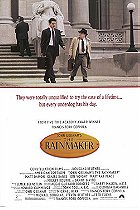 Posted : 10 years, 10 months ago on 11 August 2014 08:21
(A review of The Rainmaker)
Posted : 10 years, 10 months ago on 11 August 2014 08:21
(A review of The Rainmaker)On the one hand, if you’ve seen one John Grisham film adaptation, you’ve pretty much seen them all. On the other hand, this one was done by Francis Ford Coppola and features a tony cast. Granted, this is director-for-hire Coppola. This is Coppola on the verge of bankruptcy and trying to scrounge up funds to save American Zoetrope. So don’t go into The Rainmaker expecting Coppola to transform this middling material into grand art like he did with The Godfather series. But it is well crafted, acted, directed; the only area that really lets it down is the familiar path that all Grisham stories tell.
The Rainmaker strains credibility frequently when we focus in on the major story line: small-time lawyer takes down big fatcat legal team representing a crooked insurance company. The film shines when its plot structure becomes less rigid and instead focuses in one the rich ensemble of supporting players. An oily judge kept in the pocket of rich attorneys (Dean Stockwell), an elderly woman who is a bit of the town matriarch (Teresa Wright), a chain-smoking former employee who’s ready to blow the whistle (Virginia Madsen), an abused woman and her tentative new romance with our hero (Claire Danes), her frightening husband (Andrew Shue, much like his sister more talented than people realized and also all but disappeared), and the main family members at the heart of the story (Mary Kay Place, Red West, Johnny Whitworth).
Spending time with these various characters is entertaining; watching the machinations of the plot force them into actions or plot turns is not. Matt Damon is solidly earnest, and just reminded of how good of an actor he is. I watched this for the first time shortly after watching Behind the Candelabra, and his range is apparent. Damon seems to excel in these kind of plucky, wide-eyed characters from hard-scrabble backgrounds who are thrust into sink-or-swim situations, and he can do much with that archetype.
Even as the film brushes with story twists and turns, all of which are glaringly obvious, it is smart enough to sit back and let Damon, Danny DeVito as his lawyer variation of unbridled id and stage-mother, Jon Voight practically leaving a slime trail as the head of the corporate attorney hydra, and Danny Glover as the newly appointed judge rip up the scenery in the big legal battle. No matter the material, Coppola always manages to get the best out of his actors. And this pulpy stuff is elevated to a higher material by their acting might alone.
I don’t know if this is the greatest of the Grisham adaptations, but with the pedigree of those involved of the making of it, I’d venture that it probably is. It’s never a great film, but it’s entertaining, briskly paced, and on a technical level very strong. It’s just a shame that Grisham’s story is obviously crafted to turn here, and there, and back again down the road instead of investing in a more artful narrative.
The Rainmaker strains credibility frequently when we focus in on the major story line: small-time lawyer takes down big fatcat legal team representing a crooked insurance company. The film shines when its plot structure becomes less rigid and instead focuses in one the rich ensemble of supporting players. An oily judge kept in the pocket of rich attorneys (Dean Stockwell), an elderly woman who is a bit of the town matriarch (Teresa Wright), a chain-smoking former employee who’s ready to blow the whistle (Virginia Madsen), an abused woman and her tentative new romance with our hero (Claire Danes), her frightening husband (Andrew Shue, much like his sister more talented than people realized and also all but disappeared), and the main family members at the heart of the story (Mary Kay Place, Red West, Johnny Whitworth).
Spending time with these various characters is entertaining; watching the machinations of the plot force them into actions or plot turns is not. Matt Damon is solidly earnest, and just reminded of how good of an actor he is. I watched this for the first time shortly after watching Behind the Candelabra, and his range is apparent. Damon seems to excel in these kind of plucky, wide-eyed characters from hard-scrabble backgrounds who are thrust into sink-or-swim situations, and he can do much with that archetype.
Even as the film brushes with story twists and turns, all of which are glaringly obvious, it is smart enough to sit back and let Damon, Danny DeVito as his lawyer variation of unbridled id and stage-mother, Jon Voight practically leaving a slime trail as the head of the corporate attorney hydra, and Danny Glover as the newly appointed judge rip up the scenery in the big legal battle. No matter the material, Coppola always manages to get the best out of his actors. And this pulpy stuff is elevated to a higher material by their acting might alone.
I don’t know if this is the greatest of the Grisham adaptations, but with the pedigree of those involved of the making of it, I’d venture that it probably is. It’s never a great film, but it’s entertaining, briskly paced, and on a technical level very strong. It’s just a shame that Grisham’s story is obviously crafted to turn here, and there, and back again down the road instead of investing in a more artful narrative.
 0 comments, Reply to this entry
0 comments, Reply to this entry
 Login
Login
 Home
Home 95 Lists
95 Lists 1531 Reviews
1531 Reviews Collections
Collections